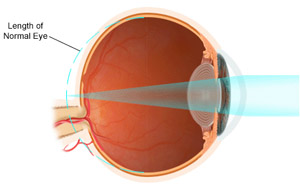[vc_row][vc_column][vc_column_text]Definition: A refractive error of the eye in which objects in the distance are usually seen clearly, but close objects are blurred.
Causes:Hyperopia results from an improper focus of light on the retina. This improper focus may be due to the corneal shape or the length of the eye. The eye focuses light with the cornea and the lens. If the cornea is too flat, the light will not come to a crisp focus by the time it reaches the retina. The same situation can also occur if the eye is too short.

How is Hyperopia diagnosed
Hyperopia is detected with a vision test called a refraction. Young patients’ eyes are dilated for this test so they are unable to mask their farsightedness with accommodation. This is called a wet refraction.
How can Hyperopia be treated
People often use the wearing of glasses or contact lenses to change the way light rays bend into the eyes. However this does not resolve the problem and is merely a cover up. Your condition is likely to worsen as the wearing of glasses or contact lenses makes your eyes ‘lazy’ for all the focussing is done by the glasses not by your eyes. Read on to discover how Eyerobics has already helped thousands of people suffering from Hyperopia enabling them to see clearly again without the use of glasses or contact lenses!!![/vc_column_text][/vc_column][/vc_row][vc_row][vc_column][vc_message style=”square” message_box_color=”danger”]
[/vc_message][/vc_column][/vc_row][vc_row][vc_column][vc_column_text]
Symptoms in India
Farsighted persons may notice that distant objects are focused well, but that nearer objects are blurred. However, young people with lower amounts of farsightedness may have no symptoms at all. When the eye is young, the lens of the eye can change shape to overcome the problem of farsightedness and focus light crisply on the retina, a process called accommodation As the person ages and reaches presbyopia , the lens looses its ability to change its focus and the farsightedness may become unmasked.
Treatment in India:
Farsightedness is easily treatable with glasses and contact lenses. Refractive surgery procedures, such as LASIK, are also an option for some people with farsightedness. Younger people and children may require no treatment at all until middle age is reached.
Prognosis in India
With glasses, contacts or refractive surgery, most farsighted patients can enjoy good vision for all of their lives.
Hyperopia (Farsightedness) in India
Farsighted individuals have shorter than normal eyes and have problems seeing up-close before the age of 40. The light of distant objects focuses behind the retina and these images are blurred. Eventually, their distance vision also starts to blur as they age. If you didn’t have up-close vision problems until you reached your 40’s, you may be experiencing presbyopia. Differentiating between the two can be confusing.[/vc_column_text][/vc_column][/vc_row][vc_row][vc_column][vc_message message_box_style=”solid” style=”square” message_box_color=”mulled_wine”]
[/vc_message][/vc_column][/vc_row][vc_row][vc_column][vc_column_text]See a general listing of the advantages and disadvantages of:
- Eyeglasses While eyeglasses are the simplest and safest way to correct farsightedness, eyeglasses can be easily broken or lost. But they also provide eye protection.
- Contact lenses Contact lenses provide predictable vision correction, but they can increase the risk of corneal scratches and infections and can also be easily lost or damaged.
- SurgeryAlthough you may no longer need to wear glasses or contacts after surgery, some people do still need enhancements or corrective lenses after surgery. Surgery also carries risks, such as infection. Laser surgery for farsightedness is not as easy as laser surgery for nearsightedness.
What To Think About
Most people who are farsighted don’t need treatment. Whether you treat farsightedness depends on how bad your symptoms are and whether your eyes can accommodate for them.
Other considerations may affect your choice of treatment.
- Will the treatment affect your work or career? Some jobs (aircraft pilot, for example) may not allow certain corrective treatments. Be sure to check with your employer, or a professional organization or society in your field, before making a decision.
- If you actively participate in contact sports—such as boxing, football, wrestling, or martial arts—in which blows to the head, face, and eyes can occur, talk to your doctor about which treatment will work best for you.
- Certain health conditions and medications may affect the outcome of surgical treatments. For example, diseases that impair the immune system and some medications may prevent proper healing after surgery. Other conditions, such as pregnancy, diabetes, or the use of steroid medications, may cause changes in vision (refractive instability).
- Certain conditions in the eyes may affect your choice of treatment. For example, people who have a history of glaucoma, keratoconus, inflammatory eye diseases, herpes simplex keratitis, or past eye injuries or surgeries should avoid laser surgery to correct farsightedness.
[/vc_column_text][/vc_column][/vc_row][vc_row][vc_column][vc_message message_box_style=”solid” style=”square” message_box_color=”violet”]
[/vc_message][/vc_column][/vc_row]



